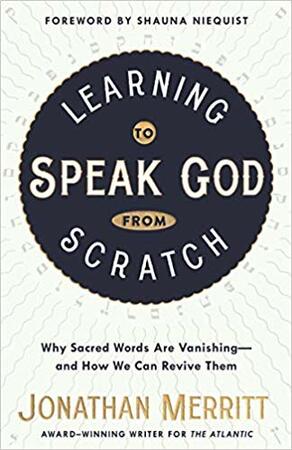How and what we say affects what we believe. I saw this in my research for The Jesus Gap, which found that 73% of the language used by high school students to answer the question, “Who is Jesus?” was creedal in origin. I was further convinced of this through Amanda Drury’s fantastic book, Saying is Believing: The Necessity of Testimony in Adolescent Spiritual Development.
Because of this, I was excited to read Jonathan Merritt’s new book, Learning to Speak God from Scratch: Why Sacred Words are Vanishing and How We Can Revive Them.

The first part of Learning to Speak God from Scratch introduces readers to some current research that suggests, for example, that the “older you are, the less likely it is that you will have a spiritual conversation.” It then serves as a linguistics primer. According to Jonathan, “The language of faith – like any language and perhaps more than any language – provides the glue that binds a community together… The Christian faith would not exist – it cannot exist – without words. They are the way the religion produces progeny.”
The second section of Learning to Speak God from Scratch explores the meaning of several key sacred words, including what they’ve meant historically, what they mean currently, and what Jonathan hopes they will come to mean in the future as we rediscover them. Jonathan explores these words because “the only way to revive the lexicon of faith is to revisit our most sacred terms, asking which ones need pruning, which ones need new life, which ones need space for fresh shoots to emerge.”
As a result of my own Christology research, I was particularly intrigued by Jonathan’s chapter on Creed: Heresy Hunters and Twitter Farewells. As someone who works in a denomination that relies heavily on the creeds, I appreciated Jonathan’s insight that “The creeds anchor us in the historic faith, guarding against the temptation to move the goalposts based on which direction culture seems to be advancing. In this way, the creeds provide a time-tested method of discipleship and a historic guardrail.”
Another one of my favorite chapters in Learning to Speak God from Scratch was Lost: Microaggressions and Our Common Condition. In this chapter, Jonathan explores the “lost parables” found in Luke 15 in a way that I have never seen done before. It's caused me to reexamine these parables in new ways. According to Jonathan, “The lost-ness of these items is not the item’s fault… The items are only lost because someone lost them. And they do nothing to be found, either. They are passive objects in the affair.” Based on this, Jonathan concludes that “Lost-ness is the state of being separated from the community and in need of reconciliation, but Jesus does not equate it with evil or sinfulness. Jesus gives a sweeping picture of lost-ness that encompasses all who wonder and wander…In this view, lost-ness does not quarantine “outsiders” from “insiders”. It makes space for insiders to own the roles they’ve played in fracturing community and work to reconcile outsiders. If religious insiders began living that lesson, there would truly be rejoicing in heaven.”
Ever since I began reading Learning to Speak God from Scratch, I’ve been excitedly talking about this book with people. This book is important. As Jonathan says, “When we lose our spiritual vocabulary, we lose much more than words. We lose the power of speaking grace, forgiveness, love and justice over others.” In Learning to Speak God from Scratch, Jonathan has written a book that will help us understand the power of words and in the process, reclaim them so that we can indeed speak grace, forgiveness, love and justice over ourselves and others.
*****************************************************
Disclosure: I received a free copy of Learning to Speak God from Scratch from Convergent Books in exchange for a fair and honest review.